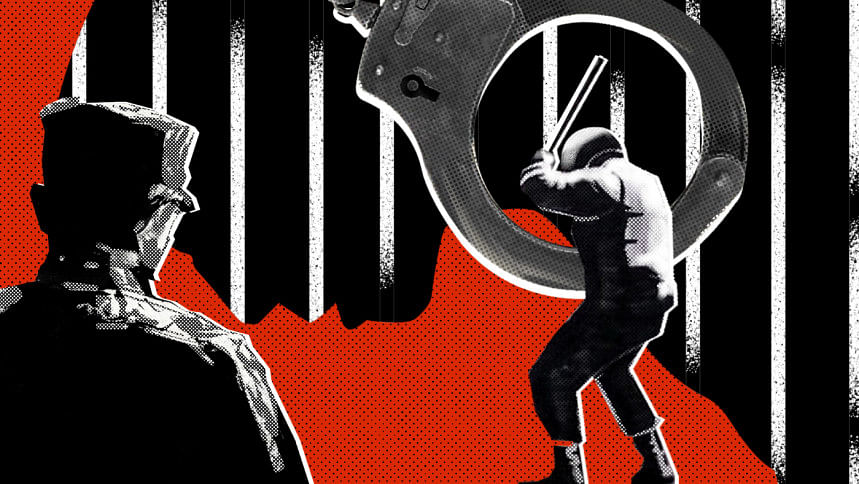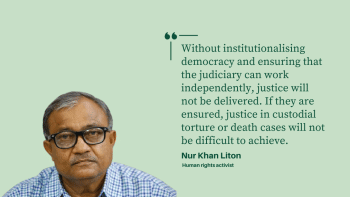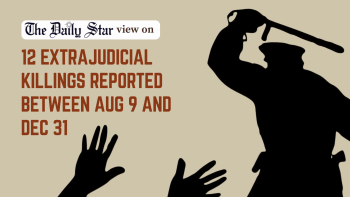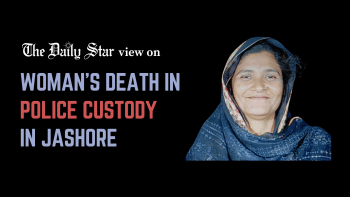How long will victims of torture wait for justice?

On June 26, the world observed the International Day in Support of Victims of Torture, signifying the devastating impacts of torture and the need for justice and accountability for victims. As Bangladesh is on board with transitional justice, this day holds particular significance for all of us in the country to reflect on how to finally take action regarding the many allegations of custodial torture, abuse, and deaths by law enforcement agencies over the decades.
Bangladesh is party to the core international human rights instruments which expressly prohibit torture and degrading treatment, including the United Nations Convention Against Torture (UNCAT), the International Covenant on Civil and Political Rights (ICCPR), and the Convention on the Rights of the Child (CRC). As such, Bangladesh has committed to uphold the rights of detainees and protect individuals from suffering torture or any form of cruel, degrading or humiliating treatment. However, the reality on the ground is that justice for victims remains elusive, and perpetrators are rarely held accountable for their actions.
A poignant example of such custodial abuse is the case of Md Limon Hossain. In March 2011, when Limon was a 16-year-old school student, his life was permanently changed. Limon was shot by an officer of Rapid Action Battalion (Rab-8) while returning home after grazing a cow in a field near his home, having apparently been mistaken for a "criminal." The shooting and its aftermath, including the loss of his left leg, was a gross violation of his rights.
After the shooting, Limon was unlawfully detained. No information was given to his family about his whereabouts for over two days, until his mother located him in a town in another district. Shockingly, he had been falsely implicated in two criminal cases (these were—but only after several years—finally withdrawn by the prosecution). Three separate probe committees were established (under the home ministry, Rab Headquarters, and the local Rab unit in Jhalakathi). The High Court also asked the home ministry, inspector general of police, Rab director general, and commander-in-chief of Rab-8 in Barishal to explain why they should not be ordered to investigate Limon's shooting and to hold the responsible persons accountable. None of these reports have been made publicly available to date.
In contrast to Limon's case and those of others that remain under investigation, there is one example of some progress in seeking justice for torture victims. Ishtiaque Hossain Jonny and his brother, Imtiaz Hossain Rocky, were both subjected to brutal torture by police in Dhaka in February 2014 after being arrested from a wedding ceremony in Pallabi, where they were trying to stop harassment of a young woman. Jonny died following the severe torture he suffered in police custody. When police refused to register a case, Rocky initiated legal action directly before a court under the Torture and Custodial Death (Prevention) Act, 2013.
In 2020, the court gave a milestone judgment, and the first convictions under the custodial torture law. Three police officers were sentenced to life imprisonment, while two police informants received seven years each for their role in Jonny's death. The court also ordered the officers to pay compensation to Jonny's family. However, Rocky has to date not received even one taka in compensation as appeals filed by the convicted officers are still pending hearing in the High Court.
Legal safeguards and limitations
Bangladesh's constitution guarantees fundamental rights which expressly prohibit torture or cruel, inhuman or degrading punishment or treatment, although this will not affect any punishment under the existing laws; death penalty remains the maximum sentence provided by various laws. It further guarantees equality before the law, to be treated in accordance with the law, protection of life and personal liberty, and safeguards against arrest and detention.
As both Limon and Jonny's cases show, our laws still fall short in addressing custodial abuse. Pre-eminent among these is the Torture and Custodial Death (Prevention) Act, 2013, which was enacted to criminalise torture and custodial deaths. Other laws that criminalise acts amounting to torture include the Penal Code, 1860, Police Act, 1861, and the Women and Children Repression Prevention Act, 2000.
The Appellate Division of the Supreme Court also issued landmark guidelines in 2016 for magistrates and police officers to observe certain legal safeguards regarding arrest and detention, including in police remand. Despite these laws and judgments, torture continue to occur behind the closed doors of detention facilities.
National accountability mechanisms are weak, and the implementation of safeguards remains woefully inadequate. Detainees often remain uninformed of charges, are denied access to legal counsel, family or adequate medical examination, and are not promptly produced before a court. Allegations of torture are frequently ignored, with magistrates failing to document such claims and law enforcement rarely held accountable, while a lack of adequate victim and witness protection leaves many to abandon their pursuit of justice.
Some of these limitations have been acknowledged by the Bangladesh government. For example, when the country ratified UNCAT, it did so subject to a declaration limiting the application of Article 14 (1), which mandates compensation, redress, and rehabilitation for torture victims, to what is provided under national laws. This means compensation is restricted to the amounts set under the 2013 act: Tk 2 lakh for deaths in custody, and Tk 25,000 for injuries from custodial torture. Under the Women and Children Repression Prevention Act, compensation amounts may be Tk 50,000 or more for rape in custody. While victims can seek a higher amount in compensation by proving a violation of their constitutional rights, Bangladesh's declaration means it is not bound to provide more under international law.
Similarly, Bangladesh's reservation to Article 14(3)(d) of the ICCPR, which guarantees the right to legal assistance and accused's presence during trial, allows trials in absentia, limiting the full application of international fair trial protections. While the constitution guarantees the right to legal representation during detention, this reservation effectively narrows the scope of Bangladesh's international obligations.
The Istanbul Protocol, an international guideline for investigating and documenting torture and conducting medical assessments of victims is not yet widely recognised or implemented in Bangladesh.
In 2019, the UN Committee Against Torture reviewed Bangladesh's compliance with its treaty obligations (to prevent and provide protection against torture), and raised several concerns: widespread torture, inadequate investigations, unacknowledged detentions, and extrajudicial actions by Rab. The committee recommended that Bangladesh strengthen its legal framework and improve the monitoring of detention facilities. To date, the country has not submitted a follow-up report to the committee as required.
Given the aforementioned gaps in the national legal framework, there are two significant steps the government can take.
First, Bangladesh can accept three key provisions of UNCAT (Articles 20, 21, and 22). If these become applicable to Bangladesh, they would allow for international inquiries into systemic torture, facilitate inter-state complaints, and enable individuals to make communications directly to the relevant UN body.
Second, Bangladesh can ratify the Optional Protocol to the Convention Against Torture (OPCAT), which requires establishing a national preventive mechanism for independent inspections of detention facilities.
It has been over 5,000 days since Limon was shot by a Rab officer, losing a limb for life, and over 4,000 days since Jonny died from police custodial torture. Yet, both continue to wait for justice. These cases symbolise the broader failure of Bangladesh's justice system to protect victims of custodial torture. Despite international commitments and national laws, law enforcement continues to operate with impunity, leaving victims and their families without real accountability or meaningful redress. In pursuit of transitional justice, Bangladesh must confront the gap between its obligations and actions reflecting on stakeholder recommendations, adopting all key international treaties without reservations, ensuring that no one has to suffer in silence, waiting for justice indefinitely.
Barrister Priya Ahsan Chowdhury is advocate at the Supreme Court of Bangladesh, associate at Dr Kamal Hossain and Associates, and consultant at Bangladesh Legal Aid and Services Trust (BLAST).
Views expressed in this article are the authors' own.
Follow The Daily Star Opinion on Facebook for the latest opinions, commentaries and analyses by experts and professionals. To contribute your article or letter to The Daily Star Opinion, see our guidelines for submission.

 For all latest news, follow The Daily Star's Google News channel.
For all latest news, follow The Daily Star's Google News channel. 













Comments